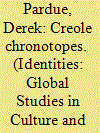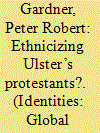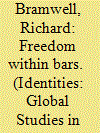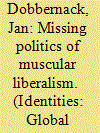|
|
|
Sort Order |
|
|
|
Items / Page
|
|
|
|
|
|
|
| Srl | Item |
| 1 |
ID:
160642


|
|
|
|
|
| Summary/Abstract |
The emergence of Kriolu or Cape Verdean Creole as a black identity should be understood in terms of chronotope, a dynamic iteration that combines time and place in the name of collective identity. The case of Cape Verdean migrants in Lisbon, Portugal, contributes to current debates on blackness as a ‘becoming’ and a complex set of practices by underscoring the role of encounters, both mundane and structural, in racialized formations. I draw from my fieldwork with Cape Verdean rappers and archival research in Lisbon between 2007 and 2013 to suggest that the particularities of Kriolu hold general theoretical lessons on the importance of migrancy and, by extension, space and temporality, in the process of racialization.
|
|
|
|
|
|
|
|
|
|
|
|
|
|
|
|
| 2 |
ID:
160641


|
|
|
|
|
| Summary/Abstract |
The Ulster-Scots ethnolinguistic ‘revival,’ often considered to be the ethnic, cultural or linguistic expression of unionism and loyalism, has recently made inroads into schools across Northern Ireland. With intercommunal educational segregation pervasive in the province, the teaching of such an ‘ethnic identity’ has potential sociological ramifications. Utilizing an in-depth textual analysis of the Ulster-Scots Agency’s educational materials and interviews with educationalists and political elites, I contend that although this ethnicization represents a break of sorts with traditional unionist-loyalist ideas rather than an unproblematic reinforcement of them, it holds considerable potential for the deepening of normative senses of communal difference.
|
|
|
|
|
|
|
|
|
|
|
|
|
|
|
|
| 3 |
ID:
160648


|
|
|
|
|
| Summary/Abstract |
This paper examines the construction of prisoners’ identity through rap in England’s high security prisons. While hip hop studies has often addressed rap’s connection to the social practices of criminalized youths, prison rap cultures have received scant attention. This paper draws on a series of rap workshops and interviews with prisoners to investigate the experiences of black prisoners in high security prisons and how identities are produced and negotiated through rap. Rap is associated with the production of a range of identities and identifications, enabling prisoners to accommodate themselves to the conditions of their incarceration and to challenge aspects of the criminal justice system that they experience as unfair or illegitimate.
|
|
|
|
|
|
|
|
|
|
|
|
|
|
|
|
| 4 |
ID:
160645


|
|
|
|
|
| Summary/Abstract |
This paper looks at current struggles of Iranian gay men to form new sexual identities that are directly tied to family structure and based on values of emotional bond and commitment to a same-sex partner. Based on fieldwork conducted among Iranian gay men in 2012–2014 and through looking at Iranian gay men’s terminologies, Hamjensgara and Gay in particular, I will clarify how Iranian gays, in a way different from that of Western LGBT activists, are trying to portray a positive image of their sexuality in relation to local family standards so they can be integrated into the Iranian family structure, which is the central space of regulating identities in Iran.
|
|
|
|
|
|
|
|
|
|
|
|
|
|
|
|
| 5 |
ID:
160640


|
|
|
|
|
| Summary/Abstract |
The article examines the idea of muscular liberalism, first invoked by David Cameron as a paradigm of assertive policymaking in opposition to ‘state multiculturalism’. The rhetoric of muscular liberalism is present across western Europe, but its political effects have not been convincingly explored. In scholarship on ethnic minority integration, a ‘stimulus–response model’ credits Muslim intransigence as the trigger for the muscular stance. Other commentators put muscular liberalism into a genealogical perspective but do little to consider the circumstances of its political deployment. Working towards an alternative account, the article examines two instances of muscular liberalism in Britain: the campaign against ‘Sharia Courts’ and the ‘Trojan Horse’ affair. Different from the concern with historical continuity or stable potentials of liberal normativity, it draws attention to political operations and strategic calculations that characterize the deployment of muscular liberalism in British politics.
|
|
|
|
|
|
|
|
|
|
|
|
|
|
|
|
| 6 |
ID:
160643


|
|
|
|
|
| Summary/Abstract |
This article investigates how US citizens living in Granada, Nicaragua, negotiate transnational belonging. Best known for a revolution and covert US intervention, Nicaragua, and in particular, the colonial town of Granada, has become a popular site for settlers from the Global North. Similar to other cases of ‘lifestyle migration’, these migrants enjoy spacious homes, maids, and upscale restaurants in a country ranked second poorest in Latin America, and governed by none other than El Comandante Ortega himself. They do not sever ties with their homeland, and form strong attachments in their new land. Fieldwork conducted in 2016 reveals that despite their international mobility, cosmopolitanism does not characterize how these migrants belong in the world. Instead, they practice privileged transnationalism in which their economic, political, and cultural power relative to that of their hosts facilitates both their mobility and their comfortable sense of rootedness in their sites of origin and settlement.
|
|
|
|
|
|
|
|
|
|
|
|
|
|
|
|
|
|
|
|
|